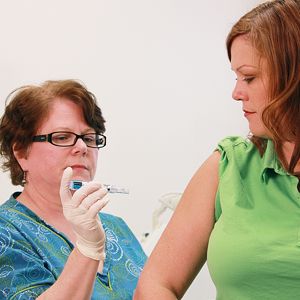Stress
Mind Over Flu Shot: Help the Vaccine Work Better
Stress can affect how well your flu shot works.
Posted October 13, 2012

CDC (Doug Jordan, M.A.)
A flu shot can decrease your risk of catching influenza, but it’s no guarantee. In the 2010-11 flu season, for example, the flu vaccine was only about 60% effective overall. Fortunately, you may be able to optimize the effectiveness of a flu shot by stressing less, socializing more, and being physically active.
Shooting Down the Flu Shot
Scientists who study the link between psychology and immunology can’t go around exposing hapless volunteers to active viruses to see what happens. So they often do the next best thing: studying how people’s immune systems respond to inactivated viruses in vaccines. In the process, they’ve learned some fascinating things about how stress influences the effectiveness of flu shots.
There’s now ample evidence that chronic, severe stress—such as the stress of caring for an aging spouse with dementia—can hamper the immune system’s ability to make protective antibodies. A meta-analysis of 13 studies showed that people with stress-filled lives had a decreased antibody response to flu vaccine.
Even under the best circumstances, flu vaccine is much better at preventing illness in the young than in the old, whose aging immune systems may not function as efficiently as they once did. Yet stress still seems to blunt the antibody response to flu vaccine in young, healthy adults, who presumably have robust immune systems.
In a study of college freshmen, for example, those who said they felt moderately stressed made fewer antibodies in response to flu vaccine than those who felt less stressed. Antibody production was down both one month after getting a flu shot, when vaccine response peaks, and four months afterward, as the response weakens.
A Shot in the Arm for Vaccine
What can you do to help your flu shot work as well as possible? Scientists don’t have definitive answers yet, but research suggests that these steps might be helpful:
- Manage chronic stress. Ongoing stress may lessen both the quantity and the quality of antibodies made in response to a vaccine.
- Practice mindfulness. Regular mindfulness meditation is a proven way to ease stress. A small study showed that it may enhance the antibody response to flu vaccine as well.
- Change your mindset. Revising overly negative thinking about difficult situations is a tried-and-true strategy for reducing stress and depression. In another small study, dementia caregivers who brooded over negative thoughts had a diminished response to flu vaccine.
- Connect with others. Being in a happy marriage may boost the antibody response to a flu shot. On the other hand, having a small circle of friends may have the opposite effect.
- Add an acute challenge. Ironically, some research suggests that a short-term blast of stress right before getting a flu shot could be beneficial. Young women who performed a stressful mental arithmetic task just prior to getting flu vaccine had higher antibody levels for weeks afterward. That may be because their bodies reacted to the stressful task by gearing up for a fight, and that included mobilizing their immune defenses.
- Be physically active. A bout of weight training immediately before a flu shot is another way to jolt the immune system into action. In addition, regular, moderate cardio workouts may extend the protective effects of a flu shot for longer in older, previously sedentary adults.
Linda Wasmer Andrews is a writer who specializes in health, psychology, and the intersection between the two. Follow her on Twitter. Like her on Facebook.


